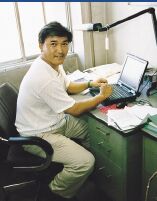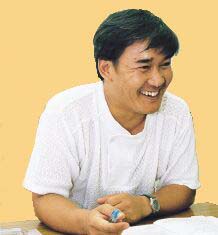
 |
Mr. Ngima Gyalgen Lama is an international student from Nepal. He is a Ph.D. student studying Agricultural Economy. He is a former president of the Kyushu University Foreign Studentsf Association (KUFSA) and is currently an advisor. As of November 1, 2001, there were 953 international students from 61 countries in Kyushu University. Through his experiences, Mr. Lama talks about the role and activities of KUFSA. |
A: After I graduated from a Nepalese university, I studied at an Indian university for 4 years, and then obtained a position with an agricultural experiment station in Nepal. Usually, people from the station go to Britain to study, however, through a natural museum project in Kanagawa, Japan, I met Professor Harutaka Sakai from Kyushu University. He helped me to study in Japan and, thanks to him, I was able to come to Kyushu University in October 1996 as a privately financed research student. For the first year, I lived in the University's International Student House (called the Kaikan). In the second year, I started a master's course, but I had to leave the Kaikan. To earn enough money for my living expenses, I had a part-time job delivering newspapers. In my third year, I became a Monbukagakusho (Japanese Ministry of Education) scholarship student. Now I am a 3rd year Ph.D. student studying under Professor Masao Tsuji.
A: There are about 15 staff members and, basically, they are volunteers. If more than one person wishes to obtain a particular position, then we will have an election. Two years ago, I was the staff member in charge of cultural affairs, and then the next year, people recommended that I become the president, so I did. This year, I am an advisor.

A: KUFSA would like to create a good environment for international students to conduct their research. To accomplish this purpose, we would like to build a human network, not only among international students, but also including Japanese people. Through the network, international students would be able to receive information necessary to live in Fukuoka and at the same time make friends.
Every month, KUFSA offers some activities. On Wednesdays, international students from one country introduce their country using VTR or slides in the Annex of International Student Center. We have some sports activities like soccer, bowling and volleyball. International students team up according to the countries or regions they are from, and together with Japanese students' teams we compete in these sports. It is like an international competition. Since we hold these games to build relationships with each other, I would also like Japanese students and faculty staff to participate in these kinds of activities. We also have Karaoke competitions at the Kaikan. Many international students are also good at enka (Japanese popular ballad). Twice a year, we have a bus trip to a historical place in Japan, like Nagasaki and Hiroshima. In addition to these, we also have dance parties, hiking, Christmas party etc.
A: Yes, this year we had our 3rd cleaning. The last two times, we collected a lot of garbage. This year, to our surprise, the amount of garbage was small. Next time, We would like to clean the campus with the university staff.
A: Of course, however, our priorities are our own research. Our staff members take time out of their busy schedules to perform their duties. Instead of spending time watching TV, we use the time for productive activities. In a sense, we can refresh ourselves through contributing to KUFSA.
A: I don't have any large requests, however, I would like to maintain the annual meeting of KUFSA staff with the university president to report our annual activities and accounting. Other than that, from my personal experience, privately financed students have economic difficulties. Since it is a personal problem, they hesitate to consult their professors about it. Therefore, I want the university to give consideration to those students.
A: I am planning to go back to Nepal. The Nepalese economy is still in low production. There are many poor people. My country gave me this opportunity to study overseas, and this is my turn to contribute to my country. This is my duty.
Although Mr. Lama seemed very busy with his research, he always made us welcome when we visited his laboratory several times for this interview. He speaks beautiful Japanese and the interview was conducted in Japanese. The photo of Nepal in his laboratory left us with an indelible impression.